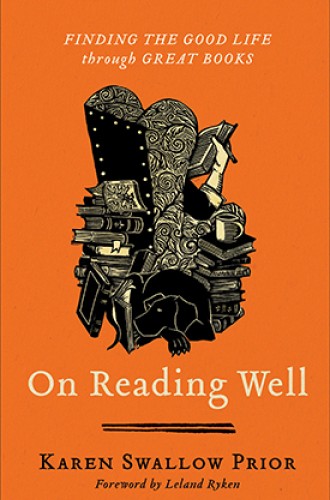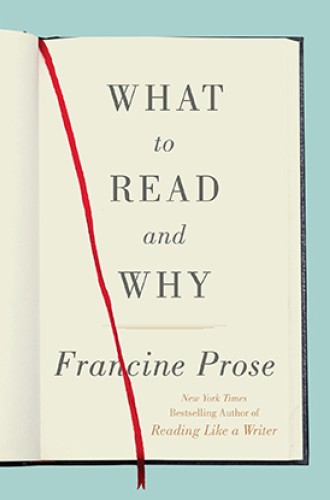Reading books about reading books can present a few conundrums. What if you haven’t read the books the authors discuss? Or find you’d rather just read the books themselves? And then there’s that metacognitive traffic circle—doing a thing about the thing that you’re doing—that’s hard to enter or exit.
Yet such books abound, including these by English professor Karen Swallow Prior and novelist and critic Francine Prose. Hand me a book of Christian literary criticism by a professor at Liberty University and one by a visiting writer at Bard who writes for the New Yorker, and I assume I’d prefer the second. I’d be wrong. Prior’s book kindled my curiosities and commitments as a reader, while Prose’s dimmed them.
Read our latest issue or browse back issues.
Prior applies the lens of moral philosophy to literary criticism in On Reading Well. Using 12 virtues as camera settings, of sorts, Prior opens both critical and spiritual apertures on literature. She focuses on prudence in Henry Fielding’s The History of Tom Jones, a Foundling, justice in A Tale of Two Cities by Charles Dickens, kindness in George Saunders’s short story “Tenth of December,” and so on. Throughout the book she projects the light of scripture, the reckoning of moral philosophers such as Aquinas and Aristotle, and the astute observations of a literary critic.
If the facts of the previous paragraphs—Prior’s employer, perhaps, or her alloy of virtue ethics and literary criticism—make you give her the side-eye, hear me out. Having studied Christian fiction, a genre frequented by acute piety and trite convention, I am on the lookout for moralism. But I simply did not find it in these pages. Prior’s unique fusion of literary reading and virtue ethics is fluent and nuanced, and it never collapses into lazy religious proposition or doctrinaire comment.
A less mature Christian literary scholar, for example, may have written off Cormac McCarthy’s The Road as secular apocalypse, devoid of a Christian worldview. But in a desolate novel absent references to religious faith, Prior makes visible the flame of the sacred. “Transcendence is the fuel, the fire itself, for the whole story and its entire journey,” she writes. When I read The Road, I will read it differently because of that sentence. I will seek the pilot light of transcendence.
And that appears to be Prior’s goal: to help us read not only differently but with more light on the subject. The introduction, in which Prior builds a sturdy case for reading virtuously, is a joyous defense of good reading. Reading toward virtue means not only tracing the morality of characters; if that were the sum of it, we’d end up back at the vapid claim that some books are Christian and others aren’t. Reading virtuously means reading well, Prior says: attending to the shape of a work, its form and aesthetic and craft. “Reading well is, in itself, an act of virtue, or excellence,” she writes, evoking Alasdair MacIntyre. “It is also a habit that cultivates more virtue in return.” (I tried to convince my adolescent sons of this the entire summer.) Reading virtuously also means “discerning which visions of life are false and which are good and true—as well as recognizing how deeply rooted these visions are in language.”
My chief criticism of the book is its fealty to the Great Books tradition. Great Books curricula and criticism, which valorize certain works of literature and commend them for study by all, have been aptly judged as elitist, ethnocentric, and gendered. Only one of the 12 chapters in On Reading Well focuses on the work of a writer of color—Shusaku Endo’s Silence. Only three focus on works by women (Edith Wharton, Jane Austen, and Flannery O’Connor). A book about literature and virtue that primarily engages the works of white male writers paddles dangerously close to undertows of privilege. What about love in Zora Neale Hurston’s Their Eyes Were Watching God? Courage in Chinua Achebe’s Things Fall Apart?
It is easy to appraise a book for the territory it does not cover; that’s criticism in negative space. Still, some rationale for Prior’s selections would have been warranted. That which a book lacks can speak loudly enough to drown out an author’s good intentions.
Then again, a diverse roster of authors is no guarantee either, as Prose’s volume demonstrates. Containing essays, book reviews, introductions to literary works, and observations about art and literature, What to Read and Why covers both “classics” such as Middlemarch and Great Expectations and the work of writers like Roberto Bolaño and Mohsin Hamid. I had not previously read Prose, so my listless response to the volume may indicate a lack of prior affection. But even those who have loved Prose may be disappointed by the abstruse—or absent—organizing principle. How does it cohere? Why these essays, and in this order? Stature in the literary world apparently purchases the right to collect and cobble.
Prose is incisive and learned, and there’s much to commend in these pages, but religious faith, such as the one in which Prior and I dwell, is inconceivable to Prose. Conventional religion, she writes in a chapter about photographer Diane Arbus’s collection of photographs Revelations, is marked by “intolerance and brutality.” On bad days, I agree. But for Prose, the photographer’s oeuvre is the only scripture to which she “can almost imagine subscribing—the temple of the individual and irreducible human soul.” This is humanism, and not in the pejorative but simply the descriptive sense of the word.
Arbus’s photographs of carnival performers, children, and misfits prompt Prose to muse that the photographer’s work creates a “church of obsessive fascination and compassion for those fellow mortals whom, on the basis of mere surface impressions, we thoughtlessly misidentify as the wretched of the earth.” Christ-haunted, that description is. For what are the beatitudes other than the naming of the wretched as the blessed? What is church other than the place we are invited to correct our thoughtless misidentifications?
Prose’s final chapter is deeply unsettling, and it reveals much about the gap between Prose’s and Prior’s definitions of good reading and the good life. A tribute to Prose’s late friend Stanley Elkin, the chapter is a portrait of her decision to read a graphic section of one of Elkin’s novellas at his funeral. Standing before the mourners, Prose writes, she gets nervous about reading the passage, which depicts the main character having sex with a bear. But an epiphany strikes: “This is what Stanley would have wanted,” she thinks. “Go out there and shock the hell out of these decent, upstanding citizens.” So she does.
Everyone should admire Elkin’s short story, Prose claims, because it leads us “into some entirely new literary domain, some unexplored region of our psyches.” I might find that sentence convincing if I didn’t know it referred to bestiality. Prose does qualify her praise; maybe not everyone should read Elkin, she admits—but certainly “all those who care about language, about literature, about life.”
Prose’s phrase “decent [and] upstanding” to describe those at Elkin’s funeral—and all who are shocked by an ursine-human tryst—is, of course, an only partially encrypted put-down. In Prose’s eyes, we who are dismayed by Elkin’s vision clutch our pearls and ban books, uninterested as we are in language, or literature, or life. It is difficult to get past such a dismissal, and I found myself wishing Prior could help me make sense of it. What would a virtuous reading of Prose look like? Of Elkin? Where is the pilot light of the sacred here?
The concept of virtuous reading would be nonsensical to Prose, if not anathema. Books “transport and entertain,” Prose writes; they “give us pleasure and make us think”—a surprisingly wan description of the transformative and spiritual act of reading. Pleasure, transport, entertainment, thinking: these are all well and good. They are also readily available at the bar or in the mall.
Prior’s book reminds us that reading, while pleasurable and transportive and entertaining and thought-provoking, is also abundantly more. In her chapter on The Road, Prior quotes Aquinas’s claim that the practice of hope is “a certain stretching out of the appetite towards good.” It’s a definition that fits reading itself. Prose celebrates the literary appetite, no matter the direction it stretches. Prior makes us hunger for a literature—and thus a life—of the good, the beautiful, and the true.







